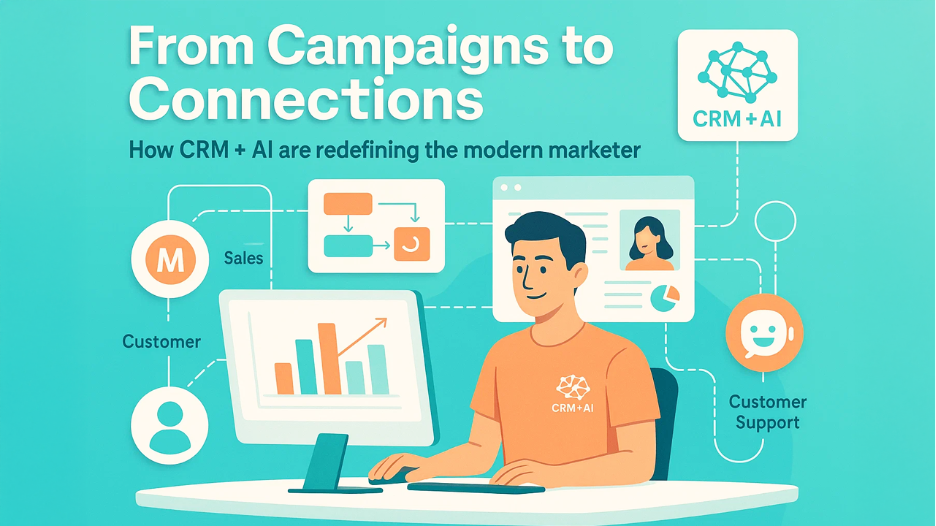The New Marketing Stack: CRM, AI & Data-Driven Experiences

The marketing world is halfway through a structural change. Traditional approaches—based on gut, mass communication, and labor-intensive segmentation—are being replaced by precision, insight, and personalization. At the center of this revolution is the new marketing stack, wherein CRM, AI, and analytics are not isolated tools but highly interdependent systems that shape business's model for winning customers, knowing customers, and keeping customers.
At the center of this change lies a central concept: marketing and CRM are no longer separated disciplines. The straightforward customer relationship management idea of yesteryear has evolved into a dynamic, data-intensive system where every customer touch creates insight, and every insight drives still more strategic, more effective campaigns.
The New Foundation: CRM as the Data Core
Customer Relationship Management (CRM) applications were originally designed as contact databases lite—solution for capturing leads, storing conversations, and tracking deals. That worked when marketing was linear and sales cycles were predictable. But in the digital economy, where customers wander among devices, channels, and behaviors, static CRM systems don't work.
Advanced CRM technology nowadays has proved to be intelligent hubs—integrating customer data from emails, ads, social media, websites, and even offline conversations. They are coupled with marketing automation software, support systems, and analytics engines to provide a consolidated real-time picture of customer experience.
This integration makes CRM not merely an administrative back-end system anymore, but instead the command center of strategic marketing now. Businesses are able to utilize CRM data to not only be in a position to sustain relationships, but predict them as well—knowing ahead of time what the customer will require prior to having to inquire.
The AI Layer: Foresight from Data
If CRM is the platform, then AI is the brains behind the new marketing stack. Artificial Intelligence brings the capacity to analyze millions of pieces of information in seconds, being able to identify patterns human marketers would never dream of.
Machine learning algorithms capture CRM data—buying record, web browsing, email activity—and turn it into actionable intelligence. AI can predict which leads have a better chance of conversion, recommend when to deploy the campaign for optimum reach, or even generate customized content for a given customer segment.
Take, for example, an AI-powered CRM integration that automatically segments leads based on behavioral scores. Instead of manually segmenting the audience by marketing teams, the system continuously optimizes segmentation based on shifting data. The result is hyper-personalized campaigns that are essentially custom-made for each and every user.
It changes not just efficiency but accuracy. Marketing was once a guessing game profession; nowadays, marketers can act with predictive accuracy. AI seals the loop between marketing gut and data-informed decisioning, and every campaign gets smarter with each iteration.
Data-Driven Experiences: Personalization at Scale
Data is the currency of customer experience. But the true magic of data occurs only when it's being translated into effective experiences. That's where the synergy between CRM and AI steps in.
By integrating CRM's structured customer data with analytics that leverage AI, brands have the capacity to build highly customized experiences at scale. Take a retail company where every email, product recommendation, and in-app message is personalized to the customer's exact spot in their journey. Not only does the system understand who the customer is, but what they're most interested in, and when they are most likely to take an action.
This degree of precision marketing was not achievable under traditional methods. That is the reason why companies embracing the new stack of marketing experience more interaction, more loyalty, and much superior ROI.
But with such personalization also comes accountability. Great data requires great accountability. Marketers today have a responsibility to drive greater transparency, ethical use of data, and customer trust. Manipulation of behavior is not the goal but relevance making-things more relevant-offering value that is organic, not intrusive.
The Changing Role of the Marketer

The development of CRM-AI integration does not just transform how marketing is practiced—it transforms who the marketer is. Marketing careers have long been defined by creative thinking and messaging. Valuable as these skills are, they are now paired with data savvy, tech competency, and strategic flexibility.
Marketers of today are expected to interpret analytics dashboards, create automation workflows, and collaborate with data scientists. The best marketers no longer visualize the world in campaigns—they see it in lifecycles of customers.
This shift also masks lines between marketing, sales, and customer support. A built-in CRM-AI solution ensures that intelligence flows smoothly across departments. Sales teams gain visibility into marketing contacts; support teams are informed about a customer's history in an instant. Every department functions in the direction of an integrated, unified customer experience.
A more integrated, flatter organizational structure—one that compensates cross-functional acumen over specialized knowledge.
The Future Stack: From Data to Decision to Delight
The evolution of CRM and marketing does not stop here. The next wave of innovation will revolve around autonomous marketing systems—where AI predicts and acts as well. Campaigns will be developed and optimized in real time, dynamically adjusting to changes in customer behavior or market shifts.
Imagine a system that indicates falling engagement for one audience segment and adjusts messaging, timing, or channel strategy automatically to win them back—all hands-off. It's not science fiction; it's already in the proto stage with next-generation marketing technology providers.
The holy grail is a stack that learns, fine-tunes, and optimizes perpetually—a self-optimizing system that aligns with business outcomes and customer expectations simultaneously.
The Takeaway: Building a Smarter Marketing Machine
The union of CRM, AI, and analytics is a watershed moment in marketing. Organizations that embrace this convergence are not simply automating—it's retooling the way relationships are built and cultivated.
In the era of content overload and excess choice, data-driven experience is the new competitive edge. Those companies that get this new marketing stack right will transcend conversion rates to something more substantial: customer loyalty, trust, and lifetime value.
The news is out—those who are using CRM as a passive database will be left behind. Those who see it as the force behind intelligent marketing will be leading the charge.
With this new marketing and CRM era, technology is not replacing human creativity—it's complementing it, enabling businesses to get to know and serve their people fast, intelligibly, and with empathy. The stack has changed, and so has the very definition of marketing.
- Art
- Causes
- Crafts
- Dance
- Drinks
- Film
- Fitness
- Food
- Giochi
- Gardening
- Health
- Home
- Literature
- Music
- Networking
- Altre informazioni
- Party
- Religion
- Shopping
- Sports
- Theater
- Wellness



